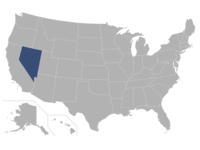Assembly Democrats, Culinary propose funding mental health with a lottery

Nevada Assembly Democrats announced Thursday that Assemblyman Cameron C.H. Miller is proposing a state constitutional amendment to establish a lottery to pay for youth mental health services.
“The last few years have shown us how critical mental health care is and that our current infrastructure is woefully inadequate,” said Miller, the Assembly assistant majority floor leader, in a release issued by the Nevada Assembly Democratic Caucus. “This constitutional amendment authorizing a lottery and dedicating the revenue to funding for youth mental health is a common sense solution that will help the many Nevada youth who are battling mental health challenges, just like I did as a child.”
Nevada is ranked last for mental health care in the nation overall and for youth mental health care according to a 2022 UNLV analysis of multiple studies.
Nevada currently is one of five states without a lottery. The others are Alabama, Alaska, Hawaii, and Utah.
In a statement released simultaneously with that issued by the Democratic Assembly Caucus, Culinary Union Secretary-Treasurer Ted Pappageore declared the union’s support for the amendment.
The lottery provides Nevada “an opportunity to create a long-term funding source directed towards mental health capacity building, without increasing taxes on Nevada residents or businesses,” Pappageorge said.
“The union will be launching a campaign to get voters to support the lottery amendment,” Pappageorge said. “We look forward to working with Assemblyman Miller on this vital effort.”
“In a state where gaming is the cornerstone of the economy, there is no public policy rationale to continue” the state’s current constitutional ban on a lottery, he added.
The lottery was prohibited in the Nevada Constitution when it was originally ratified in 1864. In the 20th and 21st centuries, efforts to establish a lottery have been stymied by the gambling industry.
A lottery “would take away from the gaming industry’s ability to do what it does best, which is to create new jobs and generate new revenue for the states, so it would come at the expense of something else,” said Virginia Valentine, president of the Nevada Resorts Association, when asked about a lottery in 2016.
In an email statement Thursday, Valentine said “We agree addressing the mental health challenges facing our youth must be a priority. We have not reviewed the details of the proposal. Any effort to amend Nevada’s Constitution should be well understood and carefully vetted for impacts to the state and its residents.”
“We look forward to being included in the discussion,” Valentine added.
Though popular with the public, lotteries are generally frowned on by researchers who have studied their impact. Lotteries have been criticized for preying on low-income households and communities of color, further impoverishing households instead of enriching them.
And prior experience has long shown that the public revenue from lotteries often fall short of promises made by lottery backers, in part because of private companies that administer the lotteries collecting large administrative fees.
But they are popular with the public, as evidenced whenever a jackpot gets big enough and Las Vegans line up at the California state line to buy tickets.
“Right now, we are sending millions of dollars across the border to neighboring states,” Miller said in the release issued by the Nevada Democratic Assembly Caucus. “It is time to fully invest in Nevadans and pass this constitutional amendment.”
The constitutional amendment creating a lottery would need to be passed by the Legislature this year, and then again in 2025, before it would go before voters in 2026.
Note: This story was updated to include a statement from the Nevada Resort Association.








